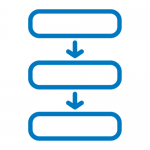About the Program
IN-PERSON, FULLY ONLINE | FULL-TIME, PART-TIME
SCHOLARSHIPS AVAILABLE
IN-PERSON, FULLY ONLINE | FULL-TIME, PART-TIME
SCHOLARSHIPS AVAILABLE
The MPH in Public Health Nutrition prepares students to promote the nutritional well-being of population groups by learning to assess the nutritional needs of various populations, planning and implementing nutrition and food programs and managing nutritional programs in community and institutional settings. The degree offers one curriculum for those who are Registered Dietitians (RDs) and another for those without this credential.
Applicants who have completed an undergraduate Didactic Program in Dietetics (DPD) from an ACEND-accredited institution with a GPA of 3.0 or higher could be considered for the Dietetic Internship within the MPH in Public Health Nutrition at CUNY School of Public Health. To be considered, please contact Prof. Ann Gaba at ann.gaba@sph.cuny.edu.
The MPH in Public Health Nutrition is not a Didactic Program in Dietetics (DPD) as required by the Academy of Nutrition and Dietetics. For information about available DPD programs, please click here.
For students who began matriculating in Spring 2019 or earlier, please review the previous curriculum for the MPH in Public Health Nutrition here.
The program is designed for students who are passionate about public health nutrition science and the nutritional well-being of population groups. The degree offers one curriculum for those who are Registered Dietitians (RDs) and another for those without this credential.
Learn to scientifically assess dietary and nutritional needs and guidelines, examine how social and environmental factors impact access to nutrition on individual and population levels and design evidence-based nutrition policies and interventions with government agencies in mind.
Graduates work in hospitals, clinics, community programs, local, state, or federal government health departments and in international nutrition programs. They coordinate and analyze nutrition research and policies, direct nutrition programs and manage school food programs among other positions.


For students who began matriculating in Spring 2019 or earlier, please review the previous curriculum for the MPH in Public Health Nutrition here.
| Foundational Knowledge (0 credits) | PUBH 601 Foundations of Public Health Knowledge* |
| Core Coursework (15 credits) | PUBH 610 Public Health Leadership & Management |
| PUBH 611 Health Equity, Communication, and Advocacy | |
| PUBH 612 Designing and Evaluating Public Health Interventions | |
| PUBH 613 Designs, Concepts, and Methods in Public Health Research | |
| PUBH 614 Quantitative and Qualitative Data Analysis Methods in Public Health Research | |
| Required Coursework (15 credits) | FNPH 620 Community Nutrition Education |
| FNPH 622 Food and Nutrition through the Lifecycle | |
| FNPH 820 Food Policy | |
| FNPH 623 Nutrient Metabolism and Applications in Public Health | |
| FNPH 624 Nutritional Epidemiology | |
| Elective Coursework (6 credits) | Two (2) electives chosen in consultation with faculty advisor |
| Practice Experience (3 credits) | PUBH 696 Supervised Fieldwork |
| Culminating Experience (3 credits) | PUBH 698 Capstone Project |
| Total Credits Required | 42 |
*Students who have a CEPH-accredited undergraduate or graduate degree in public health can be waived from PUBH 601 by submitting a Course Waiver Request.

These sequences are recommended for full-time students. Part-time students are encouraged to meet with a staff advisor to map out an appropriate plan of study.
For students who began matriculating in Spring 2019 or earlier, please review the previous course sequence for the MPH in Public Health Nutrition here.
| For students beginning their program during the fall semester: | ||
| Semester | Course | Credits |
| Year 1 Fall | PUBH 601: Foundations of Public Health Knowledge* | 0 |
| FNPH 620: Community Nutrition Education | 3 | |
| PUBH 611: Health Equity, Communication, and Advocacy | 3 | |
| PUBH 612: Designing and Evaluating Public Health Interventions | 3 | |
| PUBH 613: Designs, Concepts, and Methods in Public Health Research | 3 | |
| Year 1 Spring | PUBH 614: Quantitative and Qualitative Data Analysis Methods in Public Health Research | 3 |
| PUBH 610: Public Health Leadership and Management | 3 | |
| FNPH 622: Food and Nutrition Through the Lifecycle | 3 | |
| Elective I | 3 | |
| Year 2 Fall | PUBH 696: Supervised Fieldwork | 3 |
| FNPH 624: Nutritional Epidemiology | 3 | |
| FNPH 820: Food Policy | 3 | |
| Year 2 Spring | PUBH 698: Capstone Project | 3 |
| FNPH 623: Nutrient Metabolism and Applications in Public Health | 3 | |
| Elective II | 3 | |
| For students beginning their program during the spring semester: | ||
| Semester | Course | Credits |
| Year 1 Spring | PUBH 601: Foundations of Public Health Knowledge* | 0 |
| FNPH 622: Food and Nutrition Through the Lifecycle | 3 | |
| PUBH 611: Health Equity, Communication, and Advocacy | 3 | |
| PUBH 612: Designing and Evaluating Public Health Interventions | 3 | |
| PUBH 613: Designs, Concepts, and Methods in Public Health Research | 3 | |
| Year 1 Fall | PUBH 614: Quantitative and Qualitative Data Analysis Methods in Public Health Research | 3 |
| FNPH 620: Community Nutrition Education | 3 | |
| FNPH 624: Nutritional Epidemiology | 3 | |
| PUBH 610: Public Health Leadership and Management | 3 | |
| Year 2 Spring | PUBH 696: Supervised Fieldwork | 3 |
| Elective I | 3 | |
| FNPH 623: Nutrient Metabolism and Applications in Public Health | 3 | |
| Year 2 Fall | PUBH 698: Capstone Project | 3 |
| Elective II | 3 | |
| FNPH 820: Food Policy | 3 | |
*PUBH 601 should be completed during a student’s first semester. Students who have a CEPH-accredited undergraduate or graduate degree in public health can be waived from this requirement by submitting a Course Waiver Request.

For students who began matriculating in Spring 2019 or earlier, please review the previous competencies for the MPH in Public Health Nutrition here.

Alumni outcomes data was collected via surveys of CUNY SPH alumni one year after graduation from 2016 to 2022. See more program outcomes here.